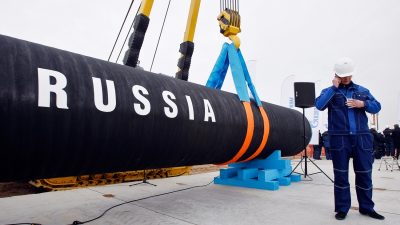US Trying to Boycott Energy Cooperation Between Moscow and Europe

All Global Research articles can be read in 51 languages by activating the “Translate Website” drop down menu on the top banner of our home page (Desktop version).
Visit and follow us on Instagram at @crg_globalresearch.
***
The current energy situation in Europe is really disturbing. The exponential rise in the price of gas directly threatens the functioning of basic sectors of European society. Amidst a scenario of growing demand for energy supply with low economic and environmental impact, European countries are looking for sustainable forms of cooperation and see Russia as the most promising ally. However, American interventionism threatens this cooperation and, consequently, all sectors of European society affected by the energy crisis.
In the entire Europe, energy prices have risen uncontrollably over the past six months, reaching historic highs, and creating an extremely dangerous crisis. Considering that more than a fifth of the electricity consumed in the European continent comes from natural gas, the dependence on this product had a strong negative impact after the recent rise in prices in the world gas market. The rise in prices is due to a series of different factors, mainly the expansion in world demand, at a time when countries end their confinements and economies are trying to return to normality in a rapid way. In short, the world started to invest less and less in energy during the last year because the economy decreased, but now Europe, which is in an advanced process of vaccination, wants to return to pre-pandemic economic development numbers quickly and efficiently – however, the structures of the energy market are not being enough to supply the demand. Since 2020, the price of gas has increased by 600%, reaching an unprecedented mark.
About 90% of the gas used in Europe comes from imports, which makes the situation on the continent tense not only for the economic superstructure, but also for the common consumers, who are dealing with the increase in the price of their tariffs. European states have been trying to articulate strategies in order to solve this problem, approving tax cuts and other measures – but nothing has been enough to overcome the harmful effects of the precarious supply.
As the largest gas provider for the EU, Russia supplied about 43.4% of the product consumed in European states last year, which makes Moscow an important strategic ally for Europe in terms of mitigating the effects of the current crisis. Indeed, the more Europe buys Russian natural gas, the sooner the energy crisis will end, considering that Russian production structures have been less affected by the pandemic than those of other countries.
Historically, the Russian-European bilateral dialogue in the gas sector has operated in an absolutely pragmatic way, generating mutually beneficial results for both sides. But things seem to be changing, with misinformation and ideological alignment overlapping pragmatism recently. Recently, American experts started to accuse Russia of using gas as a geopolitical weapon in its international relations. The most impressive point is that, despite being unsubstantiated, the accusations have prevented the realization of several partnerships and have made dialogue between Russians and Europeans difficult.
Washington alleges that Russia is deliberately generating the energy crisis in Europe, using gas as a geopolitical weapon to gain advantage. However, the arguments that would supposedly support this hypothesis are extremely weak and do not corroborate this conclusion. For example, one of the arguments is that Moscow would be boycotting the presence of its own gas on European soil by banning gas routes in Ukraine due to the Nord Stream 2 – which is a big fallacy considering that such a ban not only never occurred, but also that Russia has been exporting more and more gas via Ukraine, despite the completion of the Nord Stream works. The purpose of the accusations against Russia, in the end, seems to be just to develop an anti-Nord Stream narrative, pointing to the pipeline as a supposed cause of the crisis and making European citizens believe that Germany must end its energy cooperation with Russia.
Obviously, Moscow has denied all accusations so far. President Vladimir Putin himself said:
“Russia has always been a reliable gas supplier to consumers around the world, in Europe and in Asia, and always has fully met all its obligations. I would like to underline that the situation in the European energy markets is a bright example of the inadmissibility of hasty and politically motivated moves in any sphere, particularly in energy issues that determine stability of industries and welfare and life quality of millions of people”.
In fact, with the beginning of the crisis, Russia was the first alternative for the Europeans, who started to look to Moscow for a safe, clean, and cheap source of gas. In the first months of 2021, cooperation increased by about 15% – which certainly caught the attention of the US government. The US also supplies gas to Europe, however, via a long, difficult and dangerous route. For the American government, regardless of the safety of the route, the only important thing is to undermine Russian influence and supply the European market with its own gas.
In the current scenario, there is only one path for the European democracies, which will have to choose between passively accepting Washington’s accusations or reacting by cooperating with the only country that can solve the energy problem.
*
Note to readers: Please click the share buttons above or below. Follow us on Instagram, @crg_globalresearch. Forward this article to your email lists. Crosspost on your blog site, internet forums. etc.
Lucas Leiroz is a research fellow in international law at the Federal University of Rio de Janeiro.
Featured image is from parstoday.com/

